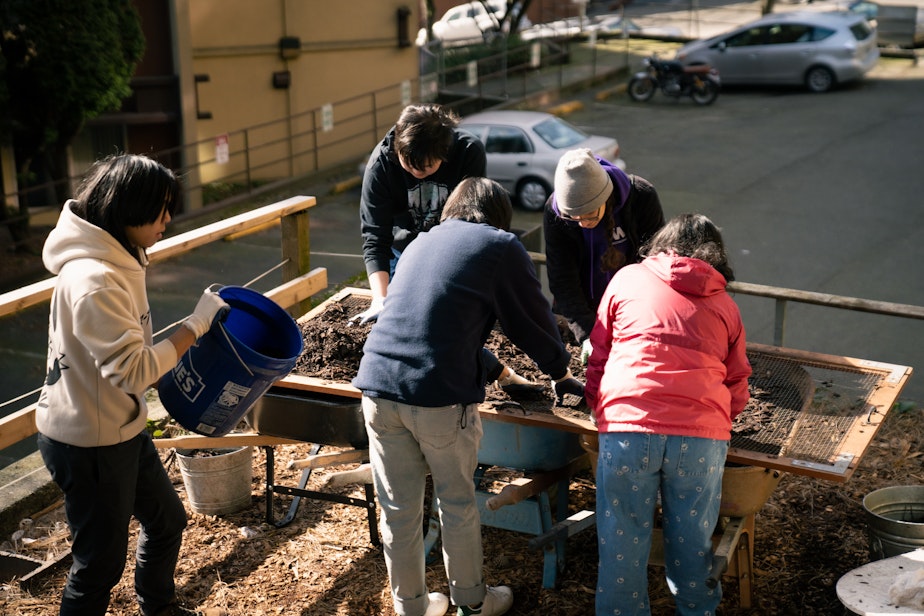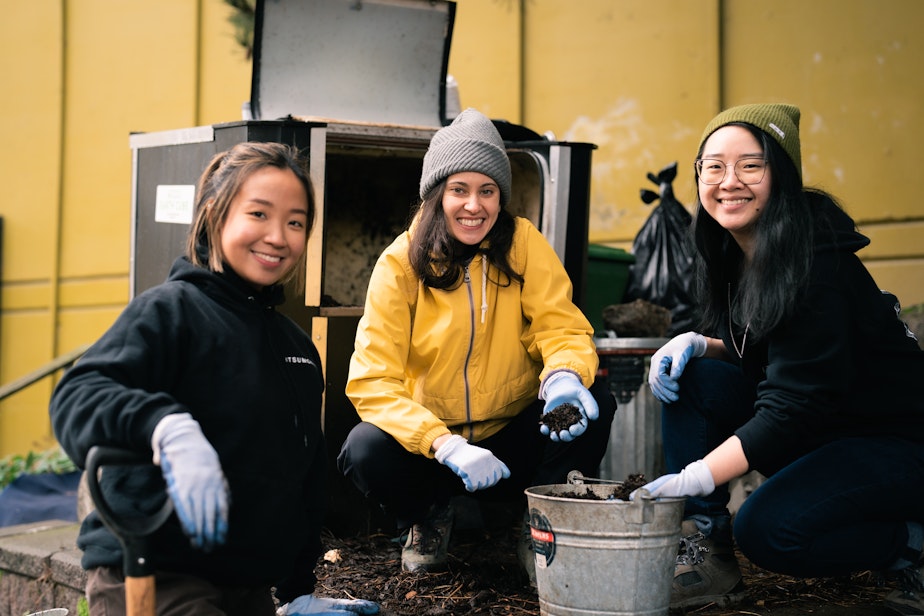This community composting initiative brings its own flavor of sustainability to the Chinatown-International District

A
t the Danny Woo Community Garden in the Chinatown-International District, Joycelyn Chui stops to check out a plant that has just started to flower with bright orange buds. She bends down to take a closer look.
“Goji berries!” she shouts.
Chui is an environmental consultant and compost enthusiast who has been gardening at Danny Woo for about two years. She understands soil chemistry and knows how to design systems with sustainability in mind.
That’s why she and her peers started a community composting initiative called Restaurant 2 Garden, which operates from Danny Woo, nearly two years ago. The idea is to create a circular, neighborhood-based economy that replenishes the earth as much as it takes from it.
Sponsored
They take food waste from two local restaurants, The Panama Hotel Teahouse and Itsumono, to make the compost. Then volunteers place the food waste into buckets filled with a compound that helps the waste break down, a process similar to pickling, known as bokashi.
Once the food has begun to break down, they transfer it into an unassuming 4 x 4 cube — called an earth cube — filled with wood chips and food scraps.
In this warm and humid environment, the food breaks down into nutrient rich compost — a process Chui’s grandmother taught her about while tending to her rooftop garden in Hong Kong.
Her grandmother would collect scraps from their kitchen and dump them into a hole on their rooftop balcony. She would casually tell Chui that the food would be gone in a month.
“And I would go look and be amazed. It's almost like the soil just eats it. But truly, it's the microorganisms in the soil [that] digested the food my grandma put in there,” Chui says.
Sponsored
So far, Restaurant 2 Garden has turned 5,000 pounds of food waste into 4,000 pounds of compost using this process.
When the compost is ready, gardeners can use it to enrich their flower and vegetable gardens. The compost is usually gone within hours, Chui says.
“The demand is there; supply is not. So that's one of the main reasons why we want to expand … we recognize there is a lot more work to do for people like this stuff,” she says.
Right now, the group is considering moving its operation to an open area near I-5 which is owned by the Chinese Southern Baptist Church. That space could hold a much larger composter that could digest more than 100 tons of food every year.
Sponsored
That means it could handle food waste from 60 restaurants — more than half of the Chinatown-International District’s vendors. Chui says it’s strategic to base their operations in a neighborhood with so many restaurants within walking distance.
“We're serious about doing organics management at a community level …because the amount of food being consumed and potentially ending up in a compost bin is just an enormous amount,” she says.
Expanding could make their operation a real-time experiment for a hyperlocal economy in action: from growing, to eating, to composting, and back to growing. It would be a proof of concept that a closed-loop food system can thrive in a dense urban setting.

Getting the word out about Restaurant 2 Garden’s compost and plans to expand will take time though. Several gardeners say they didn’t know about the compost made in the garden — but if they had known about it they would certainly be using it.
Sponsored
Right now, many elders using the Danny Woo Community Garden concoct their own compost cocktails with household ingredients like coffee beans, eggshells, and even urine.
Chui says what Restaurant 2 garden is doing is different from other community initiatives in the Chinatown-International District, at least on the surface. Other programs focus mostly on housing and other social services.
She wants to foster more environmental connectedness in the neighborhood.
“It could be composting, it could be just talking about the resourcefulness and admiring the resourcefulness of people in this neighborhood. It could be a tool library,” she says. “We just want to take a restaurant or garden to a new level. To demonstrate sustainability is easy to do, it is convenient, it should be part of our livelihood.”
Sustainable food systems come with a lot of jargonistic words and concepts: organics management, hyperlocal economy, closed loops, carbon footprint, to name some. But the roots of this work come from the same every-day wisdom Chui saw her grandmother use in Hong Kong.
Sponsored
Elder gardeners in the community are already practicing sustainability in quiet ways, like when they collect and share seeds with one another or use recycled materials to construct trellises.
RELATED: For family-run businesses in Seattle's Little Saigon, the next generation holds the keys
“There's so much energy and talk about the circular economy … our grandmas and our parents have been doing that. It's in their DNA, especially the immigrant population,” Chui says, nodding to immigrant communities that have historically been resourceful out of necessity.
These cultural and historical experiences bring a unique flavor to how residents of the Chinatown-International District practice sustainability.
“Environmentalism does not need to be white-dominated anymore. People from different cultural backgrounds can be part of the movement,” Chui says.
This story was produced in collaboration with International Examiner.




